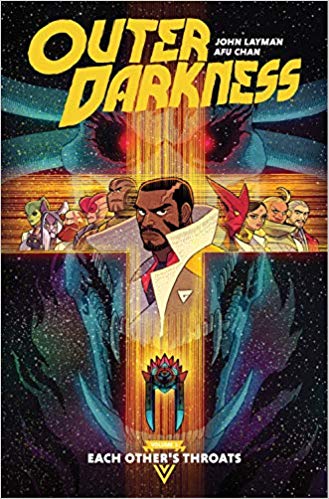Thursday Comics Hangover: To darkly go where no one has gone before

To put it in Hollywood pitch-meeting terms, Outer Darkness is Star Trek as written by H.P. Lovecraft (without the latter's monstrous racism.) Like most pitches, it's an accurate description, but it's also wholly inadequate.
The new series — the first collection of which went on sale yesterday — is written by John Layman and illustrated by Afu Chan. Outer Darkness seems set on upending audience expectations. Chan's art, for one thing, is cartoonier than you might expect for a horror artist.
Horror comics, from EC Comics to the modern day, tend to lean on realistic art in order to make the audience as squeamish as possible. When the neck being menaced by a butcher knife looks realistic, for instance, you're more likely to wince in sympathy than if it's a simplistic cartoon neck. But a more realistic artist would likely make the sci-fi setting feel cheap or unbelievable.
Chan, though, is a perfect fit. He can illustrate a haunted sun or a starship's bridge overcome with a plague of demonic eyes. It's all one cohesive universe, and nothing feels too bizarre to believe. Without his deceptively simple designs, the book would likely fail to blend the magic and the science in a believable fashion.
Layman obviously has a plan in mind for this book. Captain Joshua Rigg is a compelling lead character — he's just taken command over the Charon, and nobody (including the reader) knows if they can trust him. He's not afraid to bend the rules to do a little treasure hunting, but he seems to have some sort of a half-baked moral code in place.
Part of the pleasure of this first volume of Outer Darkness is seeing what kind of world Layman and Chan are building. The ship has its own exorcist, and a mortician on hand. It's powered by a demon god rather than a warp core. Death isn't as permanent as you'd expect.
Outer Darkness is a classic sci-fi adventure story turned on its head, a story about bad people trying to thrive a dark universe. It's an ingenious premise, and Layman and Chan make the most of it.